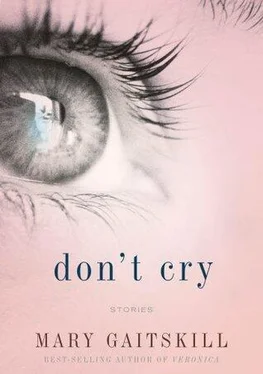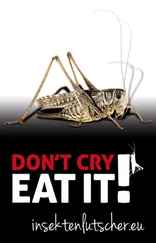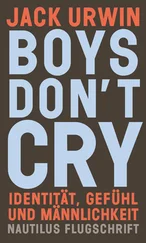Here was her gate, A6. It seemed that she always departed from gates that were low alphabetically and numerically — an example of something to which Susan might attach mystical significance. She sat down with a proprietary “Oof.” Well, Susan had made her beliefs work for her. She had made a life. She had a “partner,” a woman named Julie, who managed a bookstore. Susan had worked on Bea's “aura” several times, and if the “therapy” didn't help, it was still pleasant to have her daughter's hands working above her, close enough to feel the heat of her palms, working to give her mother healing and happiness. She took out her book-club novel— something literary from another century, the name of which she had a hard time remembering — and a newsmagazine. She looked through her purse, found her glasses, looked up, and — there he was again, the little dark-skinned boy she had seen earlier. He was singing as he fooled around on some plastic chairs, hopping neatly over each armrest, his face glowing with pleasure. Bea smiled to see him.
She put her glasses on, remembering Susan at his age, when she and Mac found her in their bedroom, leaping up and down on their big bed as if it were a trampoline, ecstatically whipping her hair about and crying, “Eeee! Eeee! Eeeeee!” Bea was about to make her get down, but before she could, Mac kicked off his shoes and climbed up onto the bed with his daughter. “Eeeee!” he yelled, jumping once, landing on his rear, and bouncing from there. Bea said, “Careful, Mac, careful!” but she was smiling. Dinner was about ready to come out of the oven; she could still remember the meaty smell of it, and the big green leaves of the bush outside pressing against the windowpane. “Daddy!” shouted Susan. “Daddy!” His shirt had come out of his pants, and his face was pink and joyous.
Nothing but contempt—
Bea put her book down and felt her face flush. It was Megan who had contempt. Contempt for her father's sadness and his failure at medical school and his job at a pharmacy Contempt for his rage, especially for his rage; when he lost his temper and slapped her, her blue eyes were hot with scorn. It wasn't that his violence didn't hurt her — it did. His sarcasm and ignoring hurt her, too. But in adolescence, scorn rose up from her hurt like something winged and flaming. At fourteen, she lectured Bea on sexism as if her mother were a perfect idiot. When Bea drove her to a sleepover, or to buy new shoes, or any other time they were alone together, Megan would say, “It's unfair. He acts like a big baby and then he bosses you! You should stand up to him or leave!”
It was true that Bea in some small way had liked to hear her daughter say these things. It was unfair, his constant complaining, his throwing the fork across the dining table and expecting her just to pick it up, get him a new one, and act as though nothing had happened. Somebody littered the edge of the yard, and he yelled, “I'll show you littering!” and then went out and dumped a bag of potatoes in the neighbor's drive. When Bea came home from the hospital with newborn Megan, she'd come early on Monday evening instead of on Tuesday morning, because she'd been eager and Tomasina had unexpectedly been there to give her a ride. They had no phone at home, so she couldn't call ahead, and she thought she might surprise him — but when she and her newborn child arrived, young Daddy wasn't at home. He was out having drinks and dinner with Jean, a woman he worked with. Bea had waited until after he was dead to tell it: how she was there all alone with her baby and how, when he finally got back after midnight and found her there, he ran into the laundry room, taking his shirt off as he went, stammering nonsense about wanting to help the lady they'd hired to do the laundry. The next day, Bea had looked in the hamper and seen it: his shirt covered with sticky lipstick kisses.
The air filled with floating announcements directing everyone every which way: Flight 775—ready for boarding — Gate A4. Flight 83— Memphis — delayed until further notice. Cincinnati — flight—
Her mother came up the walk, stripping down to her slip in the heat, flowering all around. She announced her adultery in public, in glorious secret. They didn't know until they found the love letters after she died. But looking back, it was there in her proud walk, for anyone who had eyes to see. Mac scuttled and hid, when he hadn't even succeeded at cheating!
“Jean was a smart cookie,” said Bea, “and she never would've kissed him all over the shirt like that if she'd done anything untoward. I think she meant that as a message to me.”
“That's what you think?” said Megan.
“Yes. I think he tried and she said no.”
“And you're telling me you don't have contempt for him?”
“Stop it, you little idiot! You little—”
Aware that people were staring, the mother of the dark-skinned boy lowered her voice to a furious mutter as she dragged her child back to his seat by the crook of his elbow. Was she even his mother? She was pale, with thinning blond hair and a small mouth — on the other hand, her body was heavy like his, tall and voluptuous. Bea tried to catch the child's eye, but he was looking down, all the life gone out of his face.
“Honey,” said Bea. “You don't understand. I felt sorry for him. It's different.”
Megan stared, and her face grew remote.
Flight 775—final call. Bea picked up her book and remembered Prue Johannsen, the oldest member of the book club, who had twice, when she meant to say “the cemetery,” said “the airport” instead. The memory gave Bea a sensation that she could not define. Prue was a beautiful ninety-year-old woman with bright eyes and a long, still-elegant neck, sloping and gentle as a giraffe's. She was a widow and she visited her husband's grave often. “I went to the airport this afternoon,” she'd say. “I think I'll have them plant some purple flowers instead of the red.”
What a strange world, thought Bea. A strange, sad, glowing world. In this world, she had married a boy who courted her with a vision of the two of them traveling together, in the jungle, in the desert, in the mountains of Tibet, bringing healing to the sick and learning from life. In this world, her boy husband became a man who got up in the morning and said, “I think I'll just kill myself,” and who at night threw a fork across the dining room table. It was the same world, but now he was dead and yet she was not a widow At night, her darkness came while she lay alone watching light and shadow on the wall: streetlamp, telephone wire, moths, bits of leafy branch; sometimes a pale rectangle of light suddenly opened its eye, revealing a ghost of movement inside it as someone in the apartment across the street used the toilet or the sink.
“I feel so old and so worthless.” Beautiful Prue Johannsen had said that one night after a discussion about Mrs. Dalloway. Everyone said, “No!” But they all knew what she meant.
Bea got to her feet, full of sudden energy. “You can still do good,” she'd said. “Prue, you can still—” She went to a nearby kiosk attended by a long-fingered East Indian bent like a pipe-cleaner man. She bought a bottle of water and a candy bar with caramel and nuts. Instead of going directly back to her seat, she walked around the gate area and approached the little dark boy and his blond mother. The mother looked up, not unpleasantly. Her eyes were deep, long-lashed, and fierce. Well, thought Bea. She is his mother after all.
“Excuse me,” she said, smiling. “You look familiar to me. Did you ever live in this area?”
“No. But my sister does.”
The little boy still looking down, bumped his feet together and hummed.
Читать дальше












